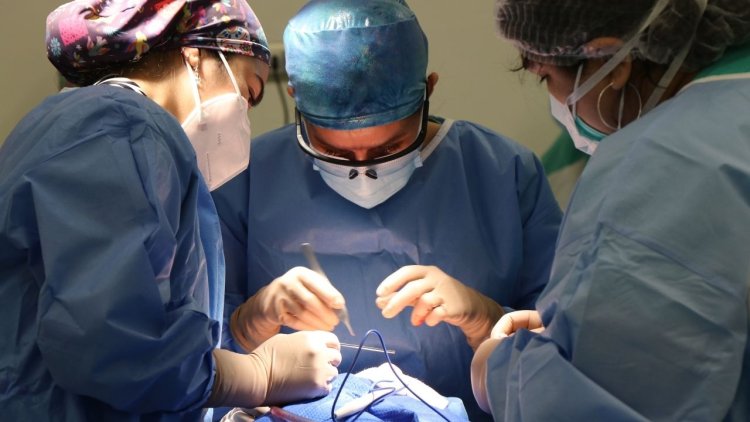Understanding Recovery Time After Spine Surgery
Recovery Time From Spine Surgery depends on the type of procedure, patient health, and adherence to post-op care. A balanced diet, prescribed medications, gentle exercises, and lifestyle changes play vital roles in healing. Monitoring symptoms and following medical advice are key to a smooth, complication-free recovery process.

Recovery Time After Spine Surgery: A Complete Guide to Healing and Lifestyle Adjustments
Spine surgery, whether for herniated discs, spinal stenosis, or degenerative conditions, is often a last resort after non-surgical treatments fail. While modern surgical advancements have improved outcomes significantly, Recovery Time From Spine Surgery is a critical period that demands a careful and informed approach. How you manage your recovery can have a lasting impact on mobility, pain relief, and quality of life.
In this guide, we will explore everything you need to know about recovering after spine surgery — from timelines and medications to diet, exercises, and lifestyle changes that support faster healing.
Understanding Recovery Time From Spine Surgery
The Recovery Time From Spine Surgery varies widely depending on factors such as:
-
Type of surgery (e.g., spinal fusion, laminectomy, discectomy)
-
Patient's age and overall health
-
Presence of underlying medical conditions
-
Adherence to post-operative care
Typically, the initial recovery phase can last 4 to 6 weeks, during which patients need rest, limited movement, and close medical monitoring. Full recovery , where you regain full strength and mobility — may take 3 to 6 months, and sometimes up to a year for complex procedures.
1. Immediate Post-Operative Measures
After surgery, patients are closely monitored in the recovery room for a few hours. The first 24-48 hours focus on pain control, monitoring for complications (like infection or bleeding), and early mobilization.
Key Measures Include:
-
Regular vitals monitoring
-
Preventing blood clots with leg exercises or compression devices
-
Starting with light movement as advised by your doctor
-
Keeping the surgical area clean and dry
2. Pain Management and Medications
Pain control is essential during the recovery period. Your surgeon will prescribe medications based on your pain levels and response.
Common medications used post-surgery include:
-
NSAIDs (Non-Steroidal Anti-Inflammatory Drugs): To reduce inflammation and manage mild to moderate pain
-
Prescription opioids: For short-term pain relief in the initial days
-
Muscle relaxants: To ease muscle spasms
-
Antibiotics: To prevent infection at the surgical site
Be sure to take medications as prescribed and discuss any side effects with your doctor.
3. Diet and Nutrition After Spine Surgery
A nutrient-rich diet supports tissue repair, strengthens immunity, and promotes faster recovery.
Recommended dietary components:
-
Protein-rich foods: Like eggs, lean meats, legumes, and dairy to help rebuild tissues
-
Fiber-rich fruits and vegetables: To prevent constipation (a common side effect of pain medication)
-
Calcium and Vitamin D: For bone healing, especially after spinal fusion
-
Plenty of water: Staying hydrated helps in managing pain, digestion, and tissue repair
Avoid sugary foods, processed snacks, and alcohol during recovery.
4. Physical Activity and Exercises
While rest is essential initially, gradual physical activity is equally important to avoid complications like blood clots or muscle stiffness.
Recommended exercises during recovery:
-
Short walks: Start with a few minutes daily and gradually increase
-
Gentle stretching: Under the guidance of a physiotherapist
-
Core strengthening and posture exercises: After initial healing, these can prevent future spinal issues
Always consult a physical therapist to create a personalized exercise routine based on your surgery type and health status.
5. Lifestyle Modifications for Faster Healing
Successful recovery is often linked to adopting healthy lifestyle practices post-surgery. Here are essential modifications to incorporate:
Avoid:
-
Heavy lifting or bending for at least 4–6 weeks
-
Sitting for long durations
-
Driving until your surgeon gives clearance
-
Smoking — it delays bone healing and increases infection risk
Do:
-
Sleep in a neutral position (back or side with support)
-
Use assistive devices like a walker or brace if prescribed
-
Attend follow-up visits regularly
-
Manage weight through diet and mild activity
Creating a home environment conducive to healing is also crucial — make sure you have support from family or caregivers and your living space is easily accessible without too much movement or stairs.
6. Warning Signs to Watch For
While most patients recover without complications, it’s vital to stay alert for symptoms that might indicate problems.
Seek immediate medical attention if you experience:
-
Fever or chills (possible sign of infection)
-
Redness, swelling, or discharge at the surgical site
-
Worsening pain despite medication
-
Numbness or tingling in the legs or arms
-
Loss of bladder or bowel control
7. Mental and Emotional Well-being
Spine surgery recovery isn’t just physical — many patients face emotional challenges such as anxiety, frustration, or depression during the recovery period.
Coping strategies:
-
Stay connected with loved ones for emotional support
-
Practice relaxation techniques like deep breathing or meditation
-
Consider counseling or support groups if needed
-
Set small, achievable recovery goals to stay motivated
Mental well-being can significantly influence how quickly and comfortably you recover.
8. Follow-Up Care
Recovery doesn’t end once you leave the hospital. Regular follow-up appointments with your surgeon are essential to track healing, adjust medications, and initiate physical therapy if required.
During follow-ups, X-rays or MRIs may be done to ensure your spine is healing as expected.
Conclusion
The Recovery Time From Spine Surgery involves a combination of rest, careful monitoring, appropriate medications, diet, physical activity, and emotional resilience. Every patient’s recovery timeline is unique, but a structured and proactive approach can accelerate healing and reduce long-term complications.
By paying close attention to your surgeon’s advice and making informed lifestyle choices, you can make your recovery smoother and more effective. Hospitals like Amcare Hospital in Chandigarh provide comprehensive post-operative care and physiotherapy services to support a full and safe recovery.
Would you like me to format this into a downloadable PDF or add a summary section?
What's Your Reaction?
















